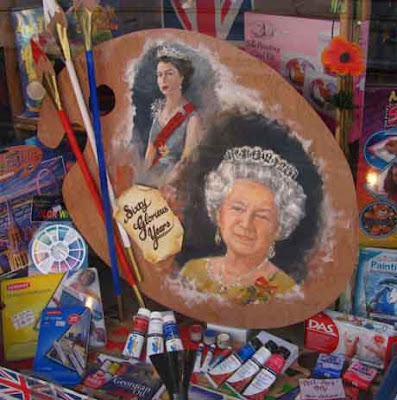Starting as we did, the United States never had a royal
family. This has made it difficult for me to understand the role that the
British royal family exerts on the average citizen in England. Whenever the subject arises on TV news,
English broadcasters and celebrities assure us that the only people who revere
the royal family are foreigners. In
particular, they point the finger at Americans, claiming that because we broke
away from England centuries ago, we suffer from a case of Royal Envy.
In the episode "The Course of True Love" of the TV show “All Creatures Great and Small,” the
veterinarians learn that King George VI has just died. Siegfried Farnon looked particularly gutted,
as if part of the basic framework of his life had just been ripped from beneath
his feet. But by the end of the story,
Queen Elizabeth II has ascended to the throne, and the vets look forward to a
glorious new Elizabethan era.
 |
| A Coronation Day Edition of "The Daily Mirror" newspaper at The World of James Herriot |
Of course, I know part of the role that the Queen and her
family play in modern England. They are
always highly sought after by organizations and businesses, and a royal visit
is always cause for celebration. Each
member of the royal family makes a hefty schedule of visits each year, and each
unleashes an army of police who make sure an area is completely secure well in
advance of the day of the visit.
Each year, the Queen also bestows honors upon prominent citizens. One year, she honored Alf Wight, who wrote his All Creatures Great and Small novels as James Herriot, with an OBE (Order of the British Empire).
 |
| A shop window display in Thirsk where Alf Wight, the real James Herriot, lived and worked. |
As she wears the crown, it makes sense
that the Queen is the most celebrated.
Everywhere we went last year in England, we saw banners announcing the
upcoming Diamond Jubilee, celebrating Queen Elizabeth’s sixty years on the
throne. Curios filled shop windows, and
streamers and union jacks decorated the streets. Handymen were kept especially busy,
repainting and repairing the fronts of houses and buildings as the celebrations
neared.
Toward the end of our vacation, a hotel manager assured me
that those who spoke disparagingly about the royal family in the TV news programs reflected
the views of the majority. From what I
could tell, he must have been right. In
the United States, our government consists of a president, along with a bunch of
elected and appointed people. Each
spends a few years in office, and then fades from view. But a royal is there to stay. He (or she) serves the entire country, for as
long as he lives. And the Queen is most
important, as she wears the crown, and represents England’s sovereignty.
 |
| "Um, excuse me, your majesty..." |
Much as I’d like to, I don’t think I’ll ever understand what
the Queen represents to the common British citizen. But I can respect the fact that she’s there,
year in and year out, through good times and bad. Regardless of economic hardships, political
scandals, war, or other difficulties.
People look to her, and in her they see everything they desire their
country to be. Given the vets reaction in "All Creatures Great and Small," perhaps most British citizens even see her as the mother of their nation. I can respect that. I suppose, in a way, I can even envy that.
Dragon Dave
Related Internet Links


No comments:
Post a Comment